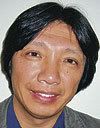Happy Birthday, Blogosphere
We are approaching a decade since the first blogger -- regarded by many to be Jorn Barger -- began his business of hunting and gathering links to items that tickled his fancy, to which he appended some of his own commentary. On Dec. 23, 1997, on his site, Robot Wisdom, Mr. Barger wrote: "I decided to start my own webpage logging the best stuff I find as I surf, on a daily basis," and the Oxford English Dictionary regards this as the primordial root of the word "weblog."
The dating of the 10th anniversary of blogs, and the ascription of primacy to the first blogger, are imperfect exercises. Others, such as David Winer, who blogged with Scripting News, and Cameron Barrett, who started CamWorld, were alongside the polemical Mr. Barger in the advance guard. And before them there were "proto-blogs," embryonic indications of the online profusion that was to follow. But by widespread consensus, 1997 is a reasonable point at which to mark the emergence of the blog as a distinct life-form.
It's fitting that blogs have an uncertain birthdate because blogs are nothing if not unanchored. Critics who question the viability of blogs because of their uncertifiability ignore two things: Blogs self correct rather viciously, and certifiability only goes so far in opinion and news; we're not building bridges and levees here, so the margin for error is somewhat greater.
 Varadarajan solicited brief essays from a number of bloggers and viewers/critics of bloggers. They're mostly quite interesting and worth a jaunt over to read their stuff. I thought I would quote from Tom Wolfe or Newt Gingrich, but of all the commentators, it was Xiao Qiang,right, founder of China Digital Times, who homered. Here, in full, is his piece, and why blogs have changed the world:
Varadarajan solicited brief essays from a number of bloggers and viewers/critics of bloggers. They're mostly quite interesting and worth a jaunt over to read their stuff. I thought I would quote from Tom Wolfe or Newt Gingrich, but of all the commentators, it was Xiao Qiang,right, founder of China Digital Times, who homered. Here, in full, is his piece, and why blogs have changed the world:Against that, Tom Wolfe's' effete discounting of blogs for being inaccurate and Chris Cox's piece on their effect on investing are merely interesting. Xiao reaffirmed why blogs give us hope.Lian Yue started his blog in the spring of 2005. A free-lance columnist, Lian lives in Xiamen, one of China's most wealthy cities on the southeast coast. His liberal-style social commentary and humorous writing quickly won him thousands of readers.
Starting this March, Lian posted a series of articles warning the people in his hometown that a paraxylene (PX) chemical factory being built in his city could have a disastrous environmental impact. He called on residents to speak out against the construction. "Don't be afraid," Lian wrote on his blog on March 29. "Please just talk to your friends, family and colleagues about this event. They might still be in the dark."
Lian is one of 16 million (and growing) active bloggers in China. While most posts are personal, an increasing number of bloggers writing about public affairs have become opinion leaders in their local communities. Despite the government's "Great Firewall" to filter out "undesirable information," and the tens of thousands of personnel hired to police the Internet, the sheer number of bloggers writing about public affairs is having a transformative impact on Chinese politics.
Xiamen authorities have vigorously deleted anti-PX factory messages on any servers within their governing territory. However, word still got out to local residents via email, IM and SMS on mobile phones. One of Lian Yue's articles on this topic was published in a newspaper in a neighboring province and spread "like wildfire" throughout the blogosphere. By the end of May, SMS messages and cellphone photos of protesting slogans such as "Boycott PX, Protect Xiamen" were sent out to millions of Xiamen residents. On June 1 and 2, against the local authorities' warning, several thousand citizens spontaneously showed up "to walk" in front of the city government with anti-PX message boards. Participants reported the protest live with their cellphones, which directly transmitted photos and text to their blogs.
The government was forced to announce a "re-evaluation" of the factory construction.
In China, blogs enable millions of citizens to express their opinions with reduced political risk simply because of the sheer number of like-minded opinions online. Facing these independent voices, the old ideological machine starts to crumble. Within society, bloggers like Lian Yue are seen as more credible voices than propaganda officials. The Chinese blogosphere is a dynamically contested terrain. What will the long-term implications be? I think the writing is already on the Great Firewall.
Labels: Blogging, Blogosphere




<< Home